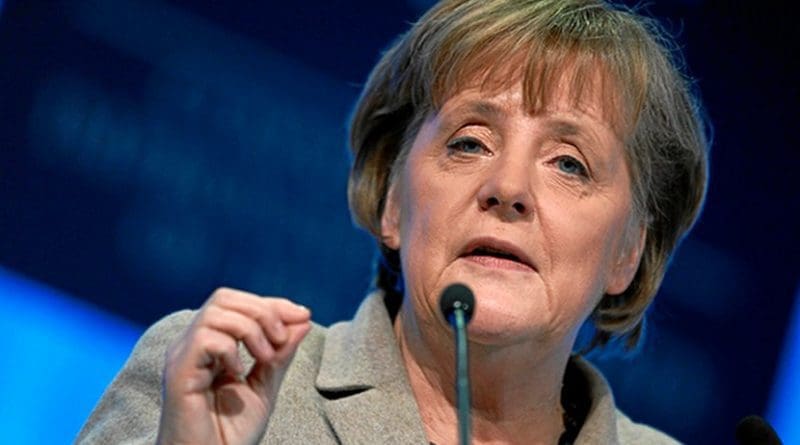Merkel Ignores Calls For Bigger Fiscal Stimulus
By EurActiv
By Jorge Valero
(EurActiv) — German chancellor Angela Merkel resisted calls to increase public spending as pressure continues to grow from her country and abroad to avoid the austerity that worsened the euro crisis.
Speaking to reporters on Monday (18 November) after a weekly cabinet meeting, Merkel said that the national draft budget for next year already included record levels of public expenditure.
“With this budget policy, we can also generate growth,” the German chancellor said.
But EU institutions believe that Berlin has more margin to act. Speaking to the European Parliament’s committee on Economic and Monetary Affairs, Eurogroup President Mario Centeno said that, in order to avoid a recession “pre-emptive action is needed”.
“I see no reason to become alarmist, but we need to act if we want to continue the recent record of economic and labour market trends,” he told MEPs on Monday.
The European Commission and the ECB has called on the governments with balanced public accounts, in particular Germany and the Netherlands, to invest more to stimulate economic growth. Germany narrowly escaped a technical recession in the third quarter with a meagre 0.1% growth rate.
Early this month, the EU executive adjusted Germany’s GDP forecast to 0.4% for this year, but further cut the growth forecast by 0.4% to 1% for next year, and to 1% in 2021.
Commissioner for Economic Affairs, Pierre Moscovici, insisted that Germany should do more on the fiscal front to support its economy.
On Wednesday (20 November), the Commission will give its opinion on the eurozone members’ national budgets for next year.
As Europe’s economic slowdown risks becoming a downturn, Centeno said that, if the recession hits, national governments should not revert to the austerity “that makes it worse”, as it happened in 2011-2012 when Europe fell into a self-inflicted economic crisis due to fiscal cuts.
“We should not make the same mistakes again,” Centeno told the Parliament committee.
Domestic pressure
At home, Merkel also faced fresh calls at home to stimulate the largest European economy.
German business association BDI and DGB, a trade union, forged on Monday a rare united front to demand more public expenditure.
“Germany must wake up from its sleeping phase,” BDI President Dieter Kempf told journalists in Berlin, Reuters reported.
“This is not primarily about fighting symptoms of a recession, but rather tackling the more deeply rooted causes of weak growth,” Kempf added.
Among the priority areas, Kempf mentioned digital and transportation infrastructure. In his view, around 0.5% of German GDP (roughly €17 billion) should be added to the €43 billion in public investment included in 2020 budget.
According to KfW, Germany’s state-owned development bank, almost €140 billion is needed in public investment across German cities.
“We can no longer afford to put the prosperity of future generations at risk with such an outdated infrastructure and underfunded education system,” DGB head Hoffmann said.
BDI and DGB’s joint statement also urged the government to reconsider the ‘debt brake’, a rule embedded in the German constitution to ensure a balanced budget.
However, speaking alongside Merkel on Monday, German finance minister Olaf Scholz turned a deaf ear to BDI and DGB’s remarks and took their comments as a sign of support to the government’s expansionary budget.
But Scholz recently showed that Berlin could reconsider longstanding positions in the realm of economy, albeit with a high price.
After almost five years of German opposition to a European-wide deposit insurance scheme, he said he was ready to support the scheme if eurozone partners reconsidered the beneficial regulatory treatment given to national debt held by banks, among other demands.
Centeno said on Monday that Scholz’s proposal brought a “shift in the mood” and “fresh impetus” when the European deposit guarantee was discussed by the eurozone finance ministers this month.
“We are now closer to a roadmap to start political discussions on a common deposit insurance,” he told the MEPs.
Eurozone countries want to adopt this roadmap in December, in order to start political discussions next year.

